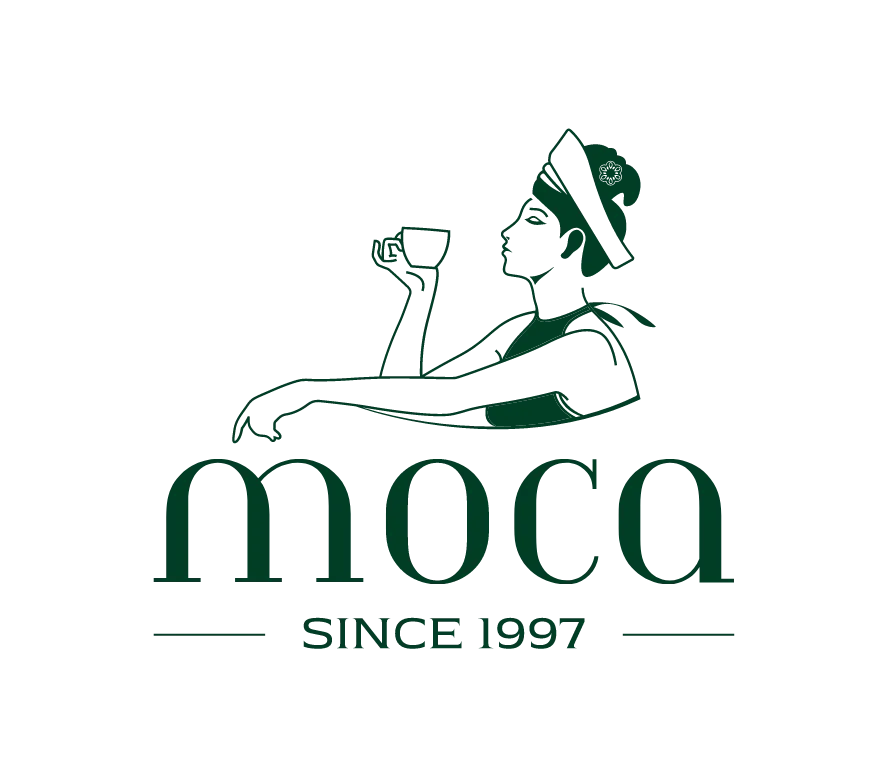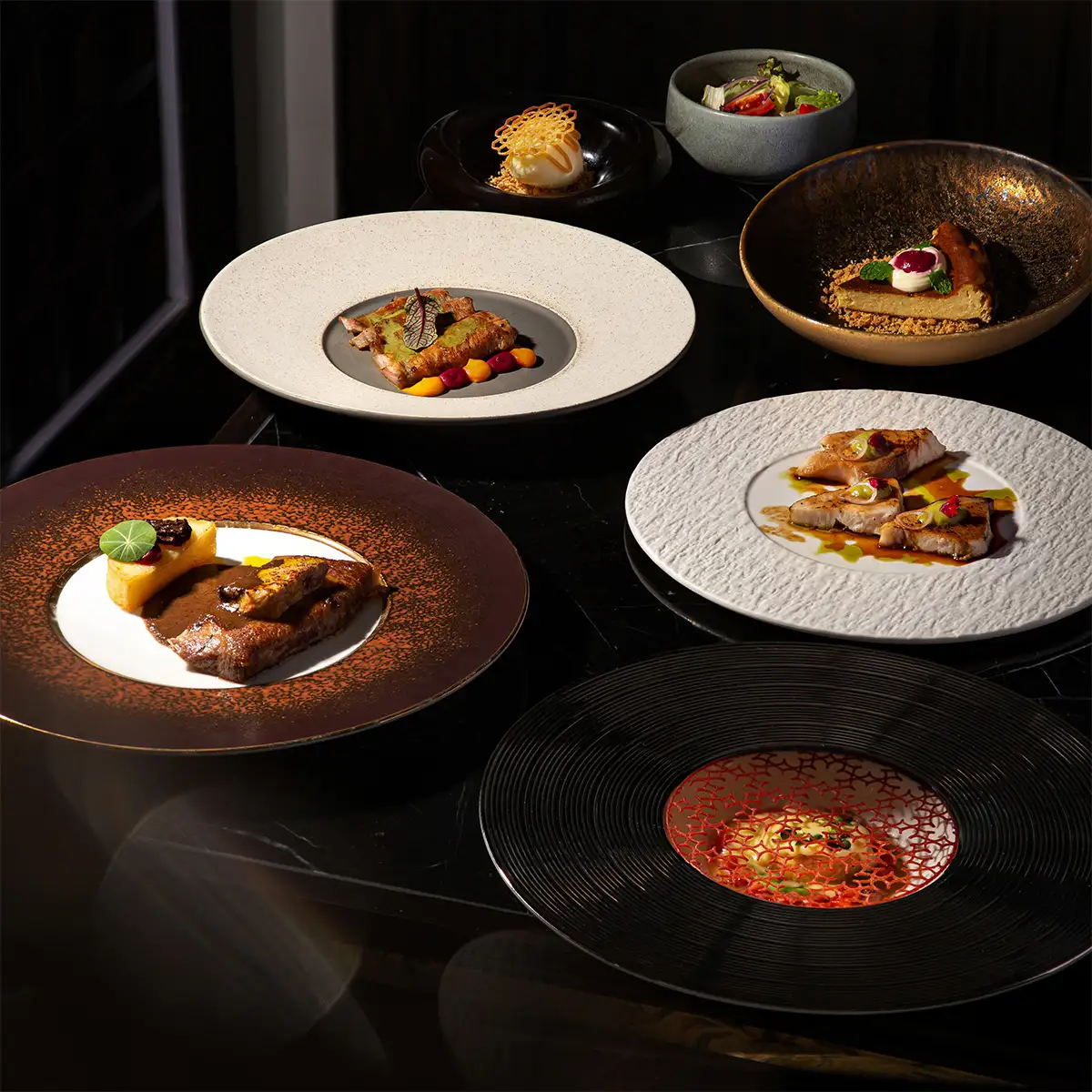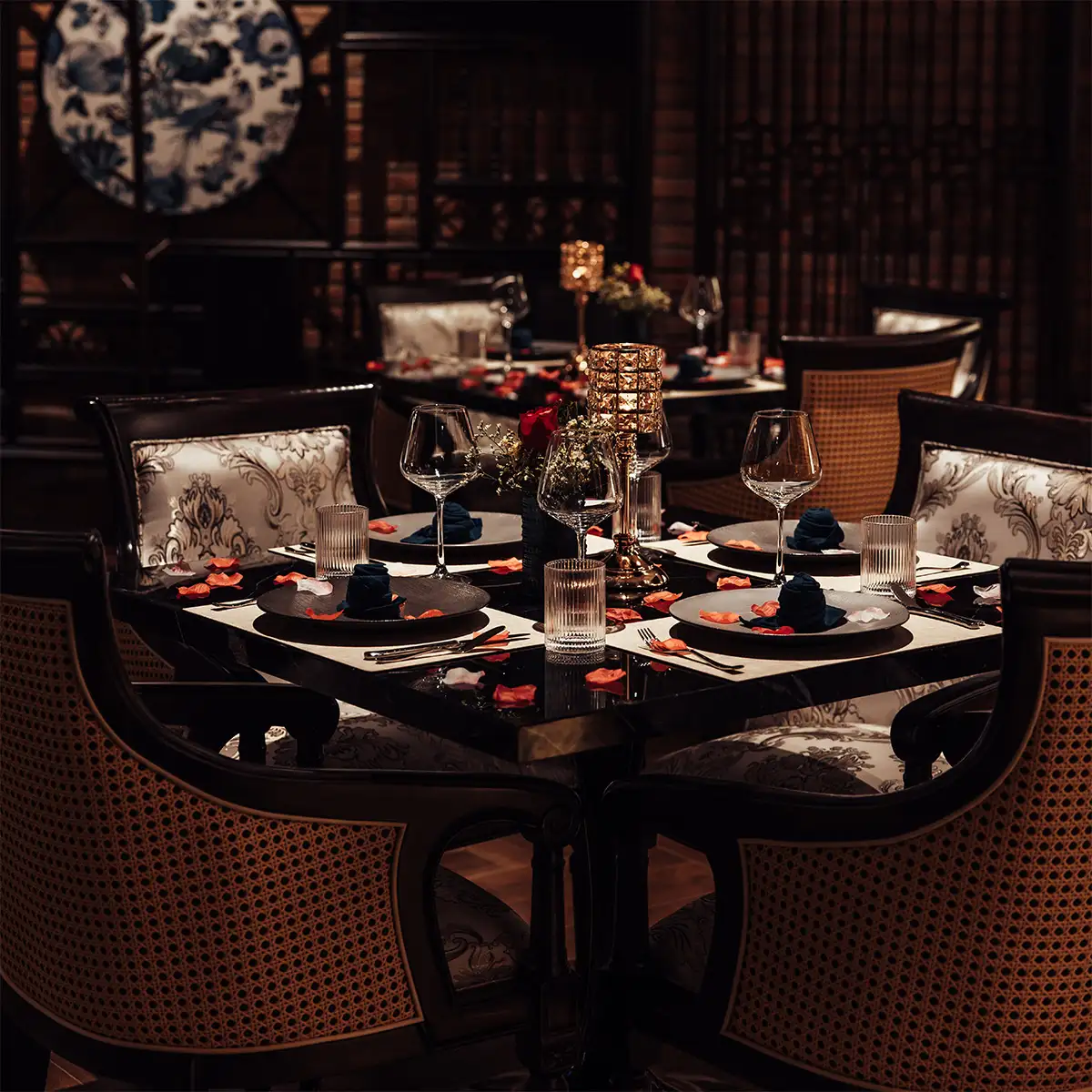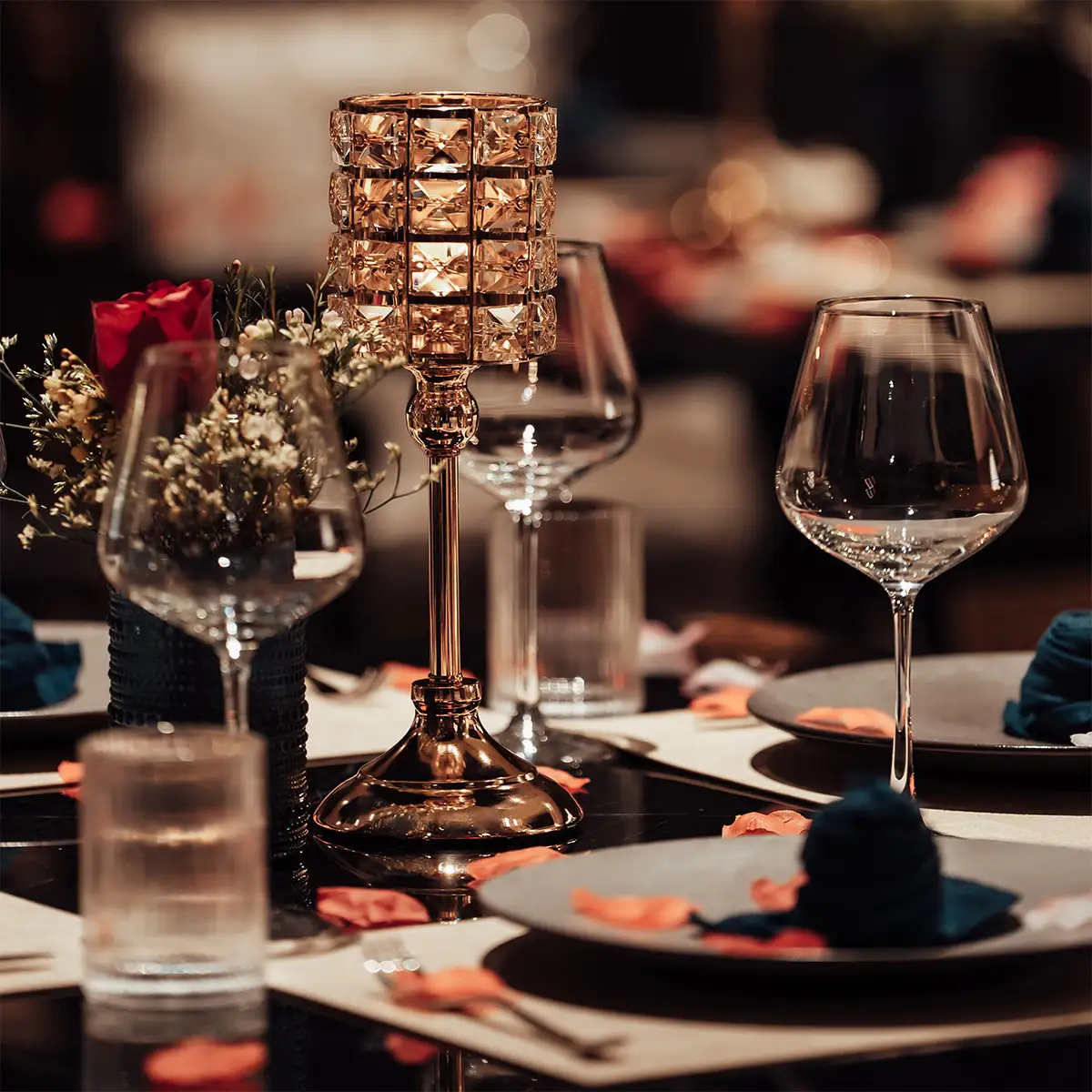In the evolving landscape of haute cuisine, the definition of a memorable meal has expanded far beyond the plate. It is an immersive experience, a symphony of flavour, service, and ambiance. Yet, for many, the intricate ballet of a formal dinner can feel intimidating. This is where fine dining workshops serve as an essential bridge, connecting the casual diner to the sophisticated world of culinary excellence. This article will explore the essence, profound benefits, and core components of these workshops, highlighting their increasing relevance in both our personal and professional lives.
1. What are fine dining workshops?
At their core, fine dining workshops are structured educational experiences designed to demystify the world of formal dining. It is crucial to differentiate between two primary types: the practical, skill-focused fine dining cooking workshops, which centre on creating gourmet dishes, and the etiquette-focused workshops, which are the subject of our discussion. These latter workshops are meticulously designed to impart the knowledge and confidence required to navigate formal dining settings with grace and poise.
The audience for such refinement is diverse. It includes individuals on a journey of personal development, professionals seeking to enhance their business etiquette and networking prowess, and culinary enthusiasts eager to deepen their appreciation for the culinary arts.
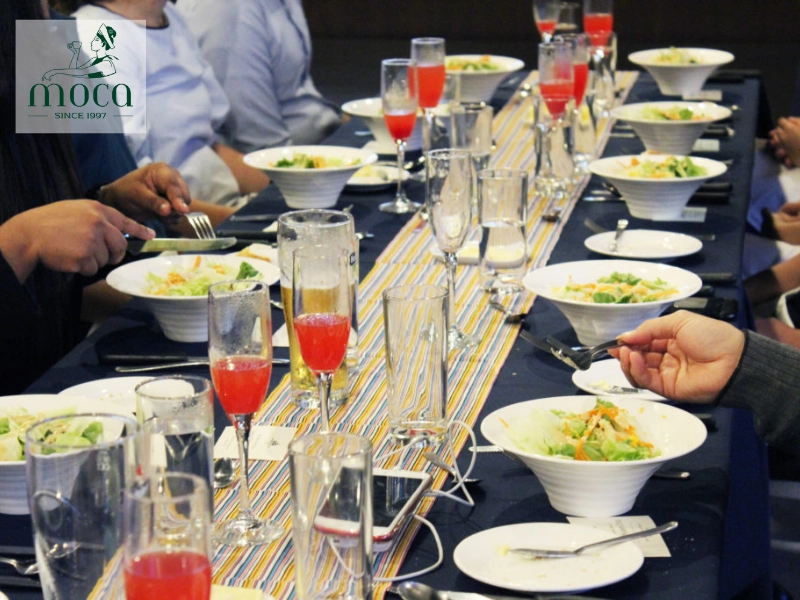
A fine dining etiquette workshop — where participants learn the art of formal dining with confidence, clarity, and class.
Learn more: The Art of Gastronomy: A Comprehensive Guide to Elegant Fine Dining Restaurants
2. Why fine dining workshops are essential for personal and professional growth
The value of mastering formal dining etiquette extends far beyond knowing which fork to use; it is a tool for profound personal and professional transformation.
- Enhancing confidence and poise: Mastering table manners directly translates to reduced anxiety and heightened self-assurance in high-stakes social settings. Consider the anecdotal example of a junior executive who, despite her professional competence, felt immense stress during client dinners, fearing she would make a faux pas. After attending a business dining etiquette course, she not only navigated these events with ease but began proactively using them as a platform to build stronger client relationships, her newfound confidence becoming a cornerstone of her professional persona.
- Making a lasting impression: In the world of business, perception is paramount. Experts in corporate communication frequently emphasize that non-verbal cues and conduct during a business meal can significantly influence professional outcomes. A study on business negotiations often highlights that a shared meal can build rapport, but only when conducted with appropriate decorum. Poor dining etiquette can be interpreted as a lack of attention to detail or respect, potentially jeopardizing a crucial deal or partnership. Conversely, impeccable manners signal sophistication and respect, leaving a powerful and lasting impression.
- Cultivating cultural awareness: In our globalized world, understanding international dining customs is a mark of a worldly and respectful individual. Etiquette workshops often cover these nuances. For instance, the American style of dining involves cutting food and then switching the fork to the right hand to eat, whereas the Continental (or European) style keeps the fork in the left hand and the knife in the right throughout the meal. Similarly, understanding Asian customs, such as the proper placement of chopsticks when not in use (never vertically in a bowl of rice, as it mimics funeral rites), is crucial for showing respect in cross-cultural interactions.
- Deepening appreciation for the culinary arts: Finally, understanding the rules of fine dining allows for a deeper appreciation of the entire experience. When one understands the logic behind the multi-course structure, the precision of the service, and the artistry of the presentation, the meal transforms from mere sustenance into a form of art. This knowledge enhances the enjoyment of every aspect of the haute cuisine journey.
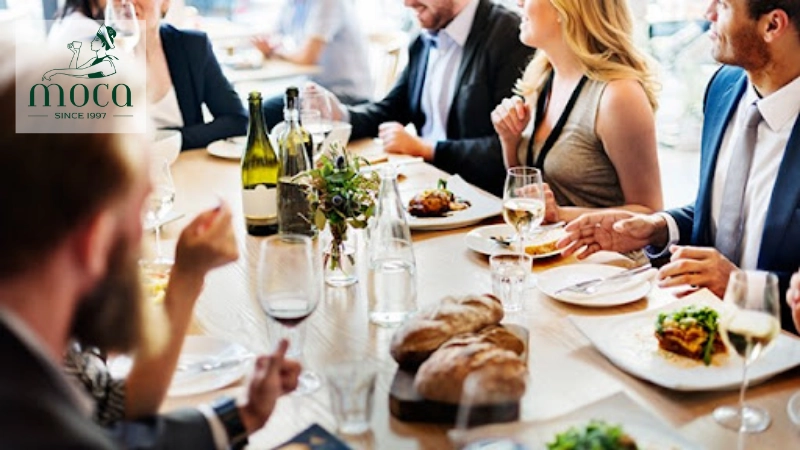
Fine dining workshops build confidence, cultural fluency, and poise for lasting social and professional impressions.
3. Key components and skills taught in a fine dining workshop
A comprehensive workshop provides a full suite of skills to ensure confidence in any formal setting.
- Navigating the table setting: The seemingly complex array of cutlery, glassware, and plates is easily deciphered with a few key principles. Participants learn the "outside-in" rule for utensils, the correct placement and use of the bread plate (to your left) and glassware (to your right), and the proper etiquette for handling napkins.
-
Dining etiquette essentials: This is the heart of the workshop, covering:
- Protocols and Posture: From being seated by the host to maintaining elegant posture.
- Service Interaction: How to discreetly signal to service staff and understand the order of service.
- Utensil Handling: The correct way to hold and use utensils for every course, from soup to dessert.
- Eating "Tricky" Foods: Graceful techniques for consuming items like oysters, escargots, bone-in fish, and asparagus.
- Wine appreciation and pairing basics: Participants are guided on how to navigate a wine list, interact confidently with a sommelier, and understand the fundamentals of wine pairing. A practical demonstration is often included, teaching the proper way to hold a glass, pour wine, and perform a basic tasting using the "Five S" method: See, Swirl, Sniff, Sip, and Savor. This segment elevates the dining experience from simple consumption to educated appreciation.
- The art of conversation at the table: A great meal is complemented by great conversation. These social etiquette training modules teach how to initiate engaging discussions, which topics are appropriate (arts, travel, literature) and which to avoid (contentious politics, personal finances), and how to politely manage interruptions to ensure a pleasant dynamic for all guests.
- Host and guest responsibilities: The workshop clarifies the distinct roles of the host (setting the tone, guiding the meal, handling payment) and the guest (arriving on time, showing gratitude, and participating graciously).
-
Dress codes and presentation: Understanding attire is non-negotiable. Detailed descriptions are provided for common dress codes:
- Black tie: For men, a black tuxedo, white formal shirt, black bow tie, and black patent leather shoes. For women, a floor-length evening gown.
- Business formal: For men, a dark tailored suit, white dress shirt, conservative tie, and leather dress shoes. For women, a suit, a tailored dress, or a skirt-and-blouse combination.
- Smart casual: For men, dress trousers or chinos with a collared shirt and a blazer or sport coat. For women, a dress, skirt, or tailored trousers with an elegant top.
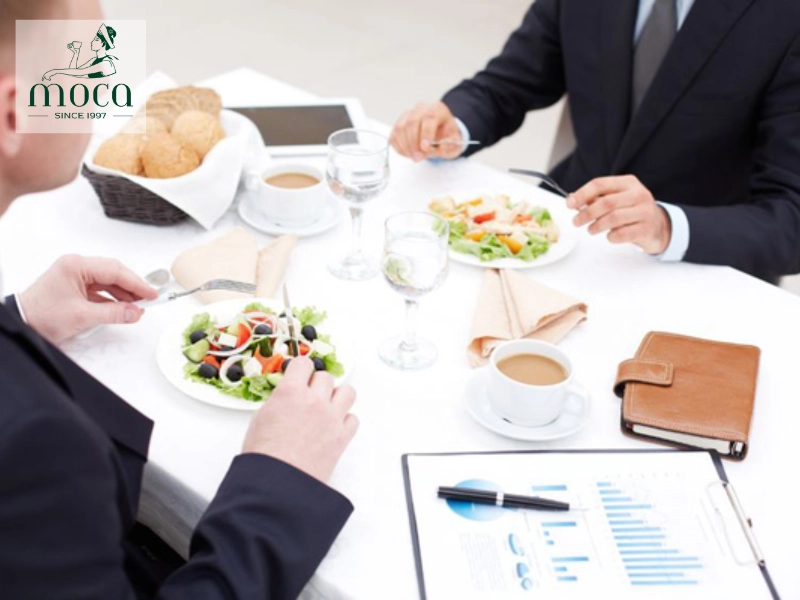
Master the formal dining experience — from utensils and etiquette to wine, conversation, and attire — in a fine dining workshop.
Learn more:How to Plate Fine Dining Dishes: The Art and Techniques of Elegant Presentation
4. Moca Dining: Where etiquette meets exquisite culinary artistry
At Moca Dining, we believe that the principles of fine dining are not relics of the past but are essential components of a truly elevated experience. Our commitment to the highest standards of service, ambiance, and exquisite culinary artistry creates the ideal environment to practice and appreciate the skills learned in a workshop. The seamless service and meticulously crafted multi-course meals at Moca Dining are a living testament to the value of proper dining etiquette and a deep appreciation for the culinary arts.
Recognizing our role as leaders in the culinary world, we see a tremendous opportunity to host or collaborate on future fine dining workshops. We envision offering specialized programs such as "An Evening of French Fine Dining Etiquette" or "Mastering the Business Dinner at Moca Dining," positioning our establishment as a centre for culinary education and an advocate for truly refined dining.
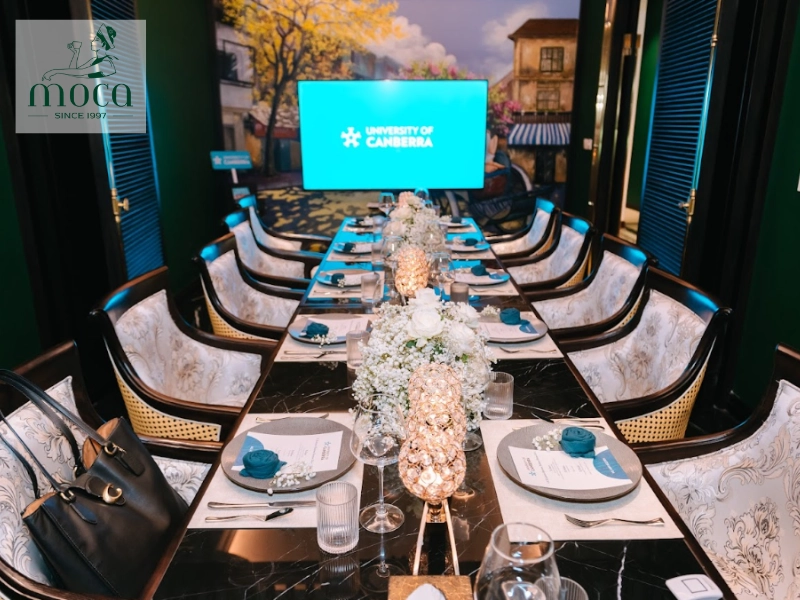
Moca Dining — where timeless etiquette meets modern culinary mastery for an elevated dining and learning experience.
In conclusion, the transformative power of fine dining workshops cannot be overstated. They equip individuals with the confidence and social graces needed to excel in both personal and professional arenas, turning potentially stressful situations into opportunities for connection and success. Mastering these skills is not about rigid rules, but about showing respect for oneself, one's companions, and the art of the meal itself. We encourage you to continue your journey of culinary discovery and to explore fine dining experiences, perhaps beginning with a reservation at Moca Dining, where you can apply and deepen your understanding of this timeless art form.
